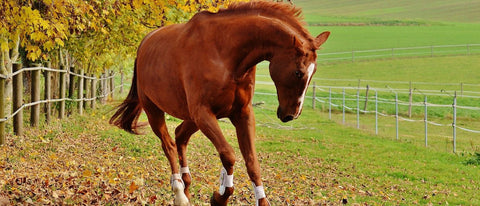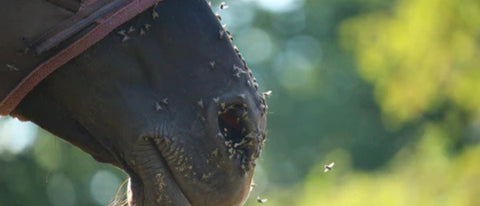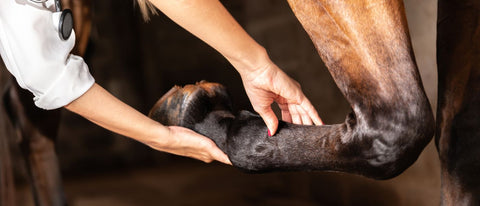
Florian ist aufgewachsen auf einem Bauernhof. Umgeben von Pferden, entdeckte er früh seine Faszination für diese majestätischen Tiere. Inspiriert von seiner reitbegeisterten Mutter, entwickelte er das Nahrungsergänzungmittel - Pferdegold. Seine tiefe Verbundenheit zur Natur und die leidenschaftliche Hingabe zu Pferden trieben ihn an, sein Unternehmen zu gründen.
Mites are small arachnids found in a variety of habitats. Some species specialize in feeding on skin flakes, hair, and blood. They infest humans and animals, including horses.
In fact, a small number of these tiny parasites are always present on horses without causing any significant symptoms. However, when they multiply uncontrollably, mites become a problem for horses.
What is meant by mite infestation in horses?
A mite infestation in horses occurs when the small arachnids appear in large numbers and typical symptoms such as
- Itching,
- Unrest
- and cause skin problems.
The combination of these is also known as mange. If a horse has mites, you should consult a veterinarian for advice on treatment options.
He can also give you tips on how to avoid mites in horses in the future or at least how to reduce the risk of an infestation.

These different mites exist
Horses are susceptible to a wide range of mite species. Grass mites, among others, are dangerous for your horse.
- Chorioptes mites: This mite species is particularly prevalent. It primarily infects the extremities and, accordingly, causes foot mange.
- Grass mites: The larvae of this mite species enter the horse via grasses and shrubs. They are often found on the head or neck area.
- Sucking mites: This mite species is responsible for body mange. It prefers to settle in particularly hairy areas.
- Ear mites: As the name suggests, these mites are usually found in the ear area. Vigorous head shaking can be a sign of an infestation.
Itching, scratching, restlessness? Here's how to find out if your horse has mites!
When it comes to mites in horses, the symptoms are often easily recognizable, but a visit to the vet is still essential. For example, severe itching can indicate a mite infestation. This can manifest itself in various ways, such as extreme restlessness in the horse .
Affected animals also often rub their fur or chew the affected areas. This often leads to other clearly visible symptoms such as
- Hair loss
- or injuries to the skin.
Since the symptoms mentioned above can indicate mites in horses, but can also indicate another cause , such as sweet itch , you should definitely consult a veterinarian for a precise diagnosis. They can identify mites in horses by taking a skin sample and examining it under a microscope.

Pferdegold® Skin & Coat
The Pferdegold Skin and Coat dietary supplement provides your horse with all the essential nutrients to support the regeneration of hooves, coat, and skin, making it easier for your horse to get through the shedding period. A balanced supply of nutrients can help support your horse's daily diet.
Order nowWhy is your horse getting an increased number of mites? Focus on possible causes
Mites are ubiquitous in horse stables , so infestation is not uncommon. However, horses with weak immune systems are at particularly high risk .
This can be due to an unbalanced diet, for example. Another common cause is unhygienic living conditions . Therefore, make sure
- the stable
- and the saddlery
- and clean your horse's blankets regularly.
Getting rid of excessive mite infestation: What are the options?
A mite infestation in horses cannot usually be eliminated with household remedies . Therefore, you should definitely seek veterinary assistance . The treating veterinarian will decide how to combat the mites . This is usually done through a combination of
- outer
- and internal use.
Special solutions and shampoos combat the mites on the horse's skin and coat. In cases of particularly severe mite infestation, this treatment is supplemented by the administration of chemical antiparasitics , administered orally or by injection. You can also take action yourself and disinfect your horse's environment.
Can mites be prevented in horses?
Mites are parasites that can be found in various places in horse stables. Getting rid of them completely is almost impossible. However, by combining various measures, the risk of infestation can be significantly reduced.
The optimal posture: This is how your horse feels completely comfortable!
Good housing conditions reduce the likelihood of your horse becoming infested with mites. Hygiene plays a particularly important role .
- Get your horse your own grooming equipment and clean it regularly.
- Groom and brush your horse at least once a day.
- The stable also needs to be cleaned out once a day and cleared of leftover food and manure.
- Strengthen your horse's immune system by ensuring sufficient exercise and a balanced diet tailored to its needs.
Horse feeding: Important tips for a balanced and nutrient-rich supply
With proper feeding, you can support your horse's skin and immune system . Make sure the feed plan contains sufficient protein . Vitamin C and zinc are also good for strengthening the immune system. Your horse often cannot absorb these important nutrients from hay and pasture grass or concentrate feed alone, especially in spring and fall.
For a balanced diet, you should therefore also supplement the feeding plan with a mineral feed . You can also mix rosehips into the food, as they contain a large amount of vitamin C.
Proper care for your horse when it comes to mites!
To support your horse's skin and coat during a mite infestation, you should adjust your care accordingly. You can use household remedies like coconut oil or tea tree oil to suffocate the mites .
Our tip: You should always discuss such additional treatment with your veterinarian.
Radiant shine: How to care for your horse's coat!
Even if there isn't currently a mite infestation, you should still care for your horse's coat. Brush it regularly to remove dirt, and examine its coat and skin closely so you can quickly notice any changes. Additionally, giving it a supplementary feed like Pferdegold® Skin & Coat may be beneficial. Our horsefly spray is effective against all types of parasites and can also help protect against mite infestation.

Pferdegold® horsefly spray
Our extra-strong horsefly spray contains a plant-based active ingredient that is extremely powerful and long-lasting – against horseflies as well as flies, ticks, mosquitoes, and other biting insects.
Order nowFeel free to check out our horse brushes . They're available for every type of coat care.
Conclusion
Mites are found in your horse's natural environment and even on its skin. An infestation becomes critical when symptoms appear. You should then consult a veterinarian for a diagnosis.
Depending on the type of mite and the severity of the infestation, they can initiate the appropriate treatment. To better protect your horse from mites, you should strictly ensure hygienic housing conditions and a balanced diet.

FAQ
Which horses are particularly susceptible to mite infestation?
Horses with weak immune systems are at risk. At the same time, hygienic housing conditions play a crucial role. By maintaining impeccable stable hygiene and taking good care of everything else that comes into contact with your horse, you make it harder for mites to spread.
What do mites look like?
Because mites are so small, they're very difficult to identify. With the naked eye, you'll probably see little more than small white or yellow dots.
Are mites contagious in horses?
Yes, mites in horses are contagious. They can be transmitted from horse to horse. There's also the possibility that humans or other animals can become infected from infected horses.
Important:
Pferdegold is not a substitute for veterinary diagnosis or treatment. The information contained in this article is for general informational purposes only and is intended to help improve your horse's well-being.
Pferdegold products do not treat or cure diseases, but rather support your horse in compensating for nutritional deficiencies through targeted nutrient intake.
However, they are not a substitute for professional advice from a veterinarian or specialist. If your horse has any health problems, we strongly recommend consulting a veterinarian. Pferdegold assumes no liability for decisions made based on the information provided here.

















